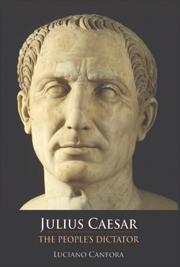Book contents
- Frontmatter
- Contents
- Translators' Note
- Acknowledgements
- Foreword
- PART I FROM SULLA TO CATILINE
- 1 In Flight from Sulla: First Experiences of an Aristocratic Youth
- 2 Prisoner of the Pirates (75–74 BC)
- 3 The Rise of a Party Leader
- 4 Pontifex Maximus
- 5 The ‘Affairs’ of Mr Julius Caesar and Others
- 6 The Political Market
- 7 Inside and Outside the Conspiracy
- 8 Caesar's Senate Speech Rewritten by Sallust
- PART II FROM THE TRIUMVIRATE TO THE CONQUEST OF GAUL
- PART III THE LONG CIVIL WAR
- PART IV FROM THE CONSPIRACY TO THE TRIUMPH OF CAESARISM
- Chronology
- Bibliography
- Index
3 - The Rise of a Party Leader
from PART I - FROM SULLA TO CATILINE
Published online by Cambridge University Press: 05 August 2013
- Frontmatter
- Contents
- Translators' Note
- Acknowledgements
- Foreword
- PART I FROM SULLA TO CATILINE
- 1 In Flight from Sulla: First Experiences of an Aristocratic Youth
- 2 Prisoner of the Pirates (75–74 BC)
- 3 The Rise of a Party Leader
- 4 Pontifex Maximus
- 5 The ‘Affairs’ of Mr Julius Caesar and Others
- 6 The Political Market
- 7 Inside and Outside the Conspiracy
- 8 Caesar's Senate Speech Rewritten by Sallust
- PART II FROM THE TRIUMVIRATE TO THE CONQUEST OF GAUL
- PART III THE LONG CIVIL WAR
- PART IV FROM THE CONSPIRACY TO THE TRIUMPH OF CAESARISM
- Chronology
- Bibliography
- Index
Summary
On returning to Rome from a journey during which, according to Velleius, he was again harassed by pirates, the ‘masters of the seas’, Caesar achieved an early electoral success: he was elected a military tribune in 72 bc for the following year. He was the first to be elected, no doubt because he was well aware of the way to win an electoral campaign. He deployed his energies in the battles characteristic of the tradition and the politics of the populares, all the more significant while the war against Spartacus was raging in Italy. He strove to support, says Suetonius somewhat vaguely, those who tried ‘to re-establish the authority of the tribunes of the plebs, the extent of which Sulla had curtailed’. His other initiative – which is better documented – was to support the Lex Plotia, designed to secure the return of the followers of Lepidus, who in the meantime had taken refuge with Sertorius in Spain, among them Caesar's brother-in-law Lucius Cinna.
The fact that the most delicate problem left behind by Sulla was the restoration of the rights of the tribunes of the plebs was well known to all the contending forces. It had already figured in Lepidus' programme, in the petitions of Gaius Aurelius Cotta in 75 bc, of Lucius Quintius in 74, of Licinius Macer in 73, and it would be one of the achievements of the consulate of Crassus and Pompey in 70.
- Type
- Chapter
- Information
- Julius CaesarThe People's Dictator, pp. 14 - 22Publisher: Edinburgh University PressPrint publication year: 2007



